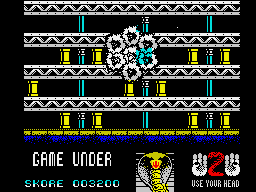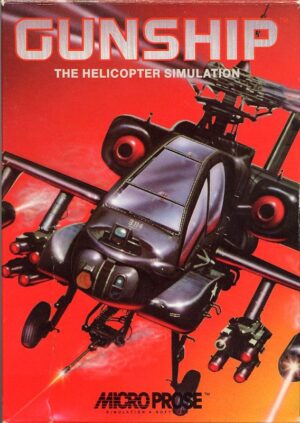Retro Replay Review
Gameplay
Cobra brings classic arcade action to life with a straightforward yet challenging structure. As Stallone’s tough-as-nails cop, you start each level unarmed, relying on a precisely timed head-butt to take down enemies. This risk–reward mechanic keeps you on your toes: mistime the move and Cobra goes down for the count, but master it and you’ll clear smaller foes without expending precious weapon time.
(HEY YOU!! We hope you enjoy! We try not to run ads. So basically, this is a very expensive hobby running this site. Please consider joining us for updates, forums, and more. Network w/ us to make some cash or friends while retro gaming, and you can win some free retro games for posting. Okay, carry on 👍)
Throughout the three distinct stages—urban streets, sprawling countryside and a foreboding factory—you’ll navigate a network of ledges, platforms and precarious drop-offs. Movement is responsive, allowing you to leap between levels to avoid gunfire or flank enemies, but the lack of a dedicated dodge button means you’ll be using that jump constantly to stay alive.
Weapons dramatically alter the flow of combat. Hamburgers scattered around each stage serve as pickups; grabbing one yields a random weapon such as a dagger, pistol or machine gun. Each armament shines in different scenarios—daggers for close-quarters stealth kills, pistols for midrange firefights, and machine guns for mowing down waves—but all are strictly time-limited, forcing you to weigh whether to save a pickup for a boss or unleash it immediately to clear minions.
Enemy patterns are predictable enough that memorization helps, yet generous bullet spreads and sudden reinforcements ensure every run feels tense. The Night Slasher’s goons vary in speed and firepower, making each confrontation feel distinct. Boss fights hinge on pattern recognition and efficient weapon use, rounding out a gameplay loop that rewards both quick reflexes and strategic item management.
Graphics
Visually, Cobra adheres to mid-’80s arcade standards with bold, pixelated sprites and eye-catching color palettes. Cobra himself is instantly recognizable in his leather jacket and sunglasses, even with a limited pixel count. Enemy designs range from generic street thugs to masked heavies wielding shotguns, each sprite clear enough to telegraph attack styles.
Level backgrounds do an admirable job of evoking their settings despite hardware constraints. The cityscape features neon signs and parked cars, the countryside showcases rolling hills and scattered barns, and the factory is filled with conveyer belts and machinery. Parallax scrolling is minimal but used sparingly to add depth, especially in the urban stage where distant buildings drift slowly behind the action.
Animations are simple but serviceable: Cobra’s idle stance, running cycle and head-butt wind-up all read clearly onscreen. Weapon fire and impacts flicker in classic arcade style, giving a visceral sense of each hit. Occasional flicker and slowdown can occur when too many sprites occupy the same scanline, but these glitches never grind the experience to a halt.
Special effects like explosions, muzzle flashes and falling debris are rendered in bright, blocky bursts that feel weighty for their era. While modern gamers might find the visuals dated, there’s a nostalgic charm in the game’s faithfully recreated arcade look. Overall, Cobra’s graphics strike a solid balance between clarity and period authenticity.
Story
Cobra’s narrative is a direct adaptation of the Sylvester Stallone film: ruthless serial killer “The Night Slasher” abducts a key witness, Ingrid Knutsen, and only Cobra can stop him. While the game doesn’t delve into lengthy cutscenes, brief intros and mid–level interludes set the stage effectively, providing enough context to keep you invested in the rescue mission.
Each stage represents a leg of Cobra’s relentless chase—from gritty city blocks where you gather initial leads, to rural roads where clues point toward the factory stronghold. Enemies are swept up in the Slasher’s reign of terror, giving every encounter narrative weight. This framing transforms standard arcade objectives into a coherent pursuit, rather than random skirmishes.
The game’s sparse dialogue is delivered through text pop-ups before each boss fight, heightening tension just enough. You get a one- or two-line taunt from the Night Slasher’s lieutenants, followed by Cobra’s terse response. These minimalist exchanges capture the film’s hard-boiled tone without bogging the pace down.
While there’s no branching narrative or multiple endings, the tight three-level run echoes classic arcade design: concise, to-the-point storytelling that complements rather than overshadows the action. For fans of the movie, these nods to Stallone’s one-liners and tough-guy ethos make Cobra’s story a satisfying, if brief, retracing of the original plot.
Overall Experience
Cobra offers a distilled arcade experience that pairs simple controls with spike-filled difficulty. It’s perfectly suited for short, adrenaline-fueled sessions where every life counts and memorizing enemy patterns is key. Newcomers may find the learning curve steep—especially mastering that lethal head-butt—but perseverance yields a rewarding sense of mastery.
The game’s three-level structure makes it approachable, yet its time-limited weapons and punishing hits keep each run tense. Even seasoned players will find themselves retrying stages to optimize weapon usage and learn enemy spawn locations. Cobra doesn’t pad its runtime with sub-quests or filler; victory means rescuing Ingrid and taking down the Night Slasher in one explosive final showdown.
Graphically and sonically, Cobra captures the nostalgic grit of an ’80s arcade cabinet. While modern beat ’em ups boast more depth and visual polish, Cobra’s lean presentation feels like a time capsule, transporting players back to a decade when action thrills were delivered in short, high-intensity bursts.
For anyone seeking an authentic retro challenge, or fans of Stallone’s film hungry for a faithful, action-packed tie-in, Cobra stands as a solid pick. It’s a compact but tough romp that reminds you exactly why those coin-op classics were built to keep you coming back for “just one more credit.”
 Retro Replay Retro Replay gaming reviews, news, emulation, geek stuff and more!
Retro Replay Retro Replay gaming reviews, news, emulation, geek stuff and more!









Reviews
There are no reviews yet.